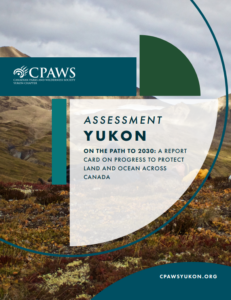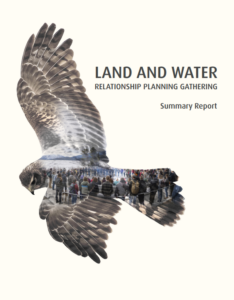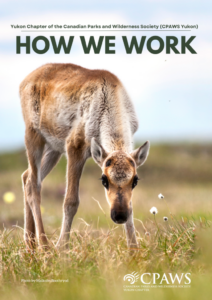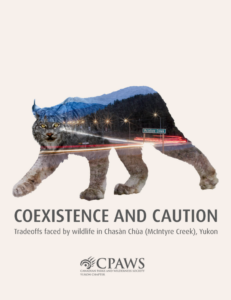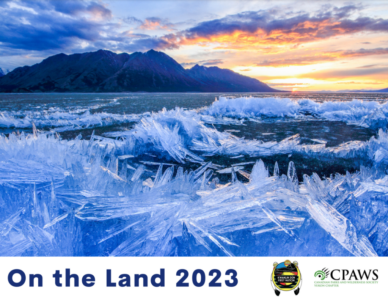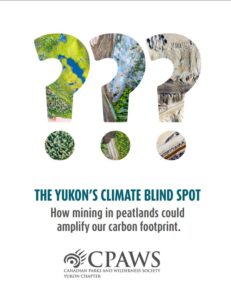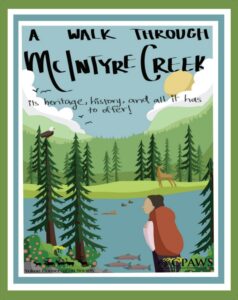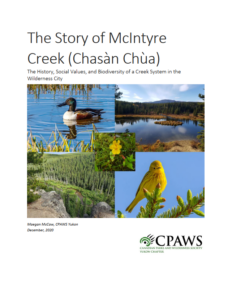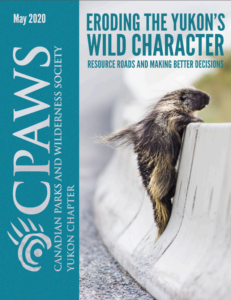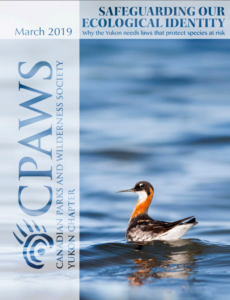Publications by CPAWS Yukon
On the Path to 2030: Yukon Assessment
The Canadian Parks and Wilderness Society (CPAWS) has reviewed progress made from 2022 through 2024 by federal, provincial, and territorial governments towards Canada’s commitment to effectively protect at least 30% of land, freshwater, and ocean by 2030.
This section presents the grade and the complete assessment of the Government of Yukon for their terrestrial conservation efforts.
Land and Water Relationship Planning Gathering Report
The Land and Water Relationship Planning Gathering took place at Haa Shagóon Hídi (Tlingit for “Our Ancestors House”), also known as the Carcross/Tagish First Nation Cultural Centre. This was the perfect space for a large yet intimate gathering. People from a broad spectrum of organizations, governments and institutions came together for this gathering to share and learn about land and water ‘relationship’ planning— an intentional step away from, and in direct opposition to, the extractive, ownership-oriented model of land ‘use’ planning.
How We Work
At the Yukon Chapter of the Canadian Parks and Wilderness Society (CPAWS Yukon), we aim to conserve the Yukon’s ecologically and culturally important lands and waters for all. We believe that public awareness, engagement, grassroots community organizing, education, and empowerment are key to achieving land and water protection.
Coexistence and Caution
Chasàn Chùa, or McIntyre Creek, flows through the traditional territories of the Ta’an Kwäch’än Council and Kwanlin Dün First Nation in Whitehorse, Yukon. From its headwaters on the slopes of Mount McIntyre, the creek meanders through chains of wetlands, short canyons and forests before emptying into the Yukon River north of downtown Whitehorse. Chasàn Chùa is a place where people and wildlife coexist, however, important decisions in the coming decades will shape the future of the creek.
On The Land 2023
A partnership between Kwanlin Dün First Nation and CPAWS Yukon, this calendar is an invitation for you to get out on the land and learn how to harvest. It’s jam packed with photos, quotes, and recipes with Southern Tutchone names.
The Yukon’s Climate Blind Spot
Peatlands are a major carbon storehouse, holding carbon that has accumulated over thousands of years. When people damage peatlands, carbon is lost to the atmosphere, adding even more fuel to the climate crisis. National peatland maps don’t provide a fine scale picture of peatlands in the Yukon, and local mapping of peat has only happened in a few pockets of the territory. That means decision makers don’t have a good frame of reference for how much carbon the Yukon’s peatlands hold, and how much of this carbon is vulnerable. This report attempts to fill some of these gaps by looking at a small but important part of the Yukon: the Indian River Watershed.
A Walk Through McIntyre Creek
A collaboration between the Canadian Parks and Wilderness Society (CPAWS) and the Yukon Conservation Society (YCS).
McIntyre Creek, also known as Chasàn Chùa, is located on the traditional
territories of the Kwanlin Dün First Nation and Ta’an Kwäch’än Council. The Creek is the heart of a wildlife corridor that flows through Whitehorse, Yukon.
The Story of McIntyre Creek
McIntyre Creek is the heart of a wildlife corridor that passes through Whitehorse, Yukon. The creek and its surrounding ecosystem hold many social, cultural, and ecological values. McIntyre Creek has a long and colorful history, beginning as a glacial meltwater channel and ending as a highly valued recreational and wilderness area that passes through the capital of the Yukon.
Eroding the Yukon’s wild character. Resource roads and making better decisions
People have complicated feelings about roads. On one hand, roads help Yukoners explore forests, lakes, rivers and mountains. On the other, we value the remoteness of places far removed from the rumble of engines. Lucky travellers might glimpse a lynx slipping across a highway, but we also see the carcasses of porcupines and songbirds along the shoulder. Roads bring many services to human societies, but are also a driving factor behind the biodiversity crisis. Roads have been called a “sleeping giant” in the understanding of humankind’s impact on the planet.
Safeguarding our ecological identity. Why the Yukon needs laws that protect species at risk
Ambitious action is needed to safeguard vulnerable species and the ecosystems they rely on. The Yukon is fortunate not to have suffered the degree of biodiversity loss that much of the planet has. Still, we cannot afford to be complacent

